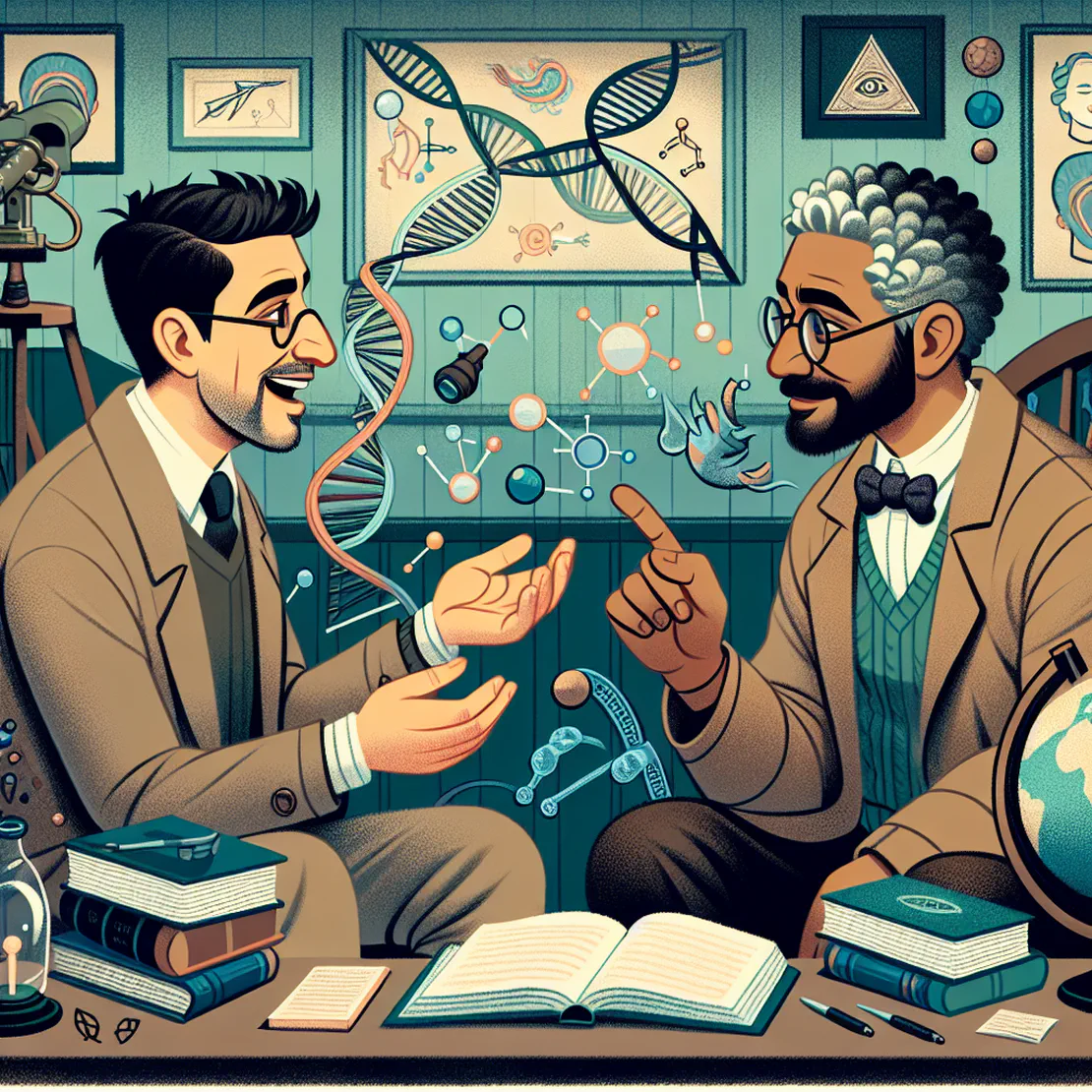
491. Symbolic Patterns: Memes, Archetypes, Dragons, Genes | Dr. Richard Dawkins & Alex O’Connor
- The Jordan B. Peterson Podcast
- Debate , Patterns , Symbolism , Genetics
- October 21, 2024
Table of Contents
At a Glance
-
Masculine Proclivity - ‘Are you more interested in things or people, would you say?’ This question emphasizes the recurring theme of differing interests and perspectives, particularly in the context of scientific versus humanistic approaches.
-
Eternal Interests - ‘I’m interested in eternal things. I’m interested in things that were true before there were any humans and will be true long after humans are extinct.’ This quote highlights the speaker’s quest for timeless truths, indicating a philosophical or scientific curiosity about universal principles.
-
Symbolism and Metaphor - ‘Which sort of kind of lets out all symbolism and metaphor and stuff like that.’ This dismissive attitude towards symbolism and metaphor underlines a preference for literal or materialist interpretations over abstract or symbolic ones.
-
Baldwin Effect Discussion - ‘Maybe. Depends on the Baldwin effect.’ This introduces an advanced psychological theory in the conversation, indicating a deep dive into how evolutionary principles might influence human cultural and psychological development.
-
Nature of Sacrifice - ‘The community is predicated on sacrifice.’ This point is significant for its exploration of the fundamental nature of human societies and the sacrifices required to sustain them, tying back to ancient texts and practices.
-
Quantum Phenomena and Biblical Texts - ‘Quantum physics is deeply mysterious, and you’re saying that biblical texts are deeply mysterious.’ This comparison is intriguing as it aligns the mysteries of modern science with those found in religious texts, suggesting a parallel in the profundity and complexity of both fields.
-
Virgin Birth - ‘Let’s stick to the Virgin Birth.’ This insistence brings the conversation back to a contentious religious belief, highlighting the tension between literal belief and metaphorical interpretation in religious discussions.
-
Cultural Christianity - ‘You said that you were a cultural Christian.’ This point touches on identity and the influence of cultural background on personal beliefs, sparking a discussion about what it means to identify with a religion culturally versus doctrinally.
-
Divine Inspiration vs. Evolving Manuscripts - ‘It’s not the same thing. I mean, either it was divinely inspired or it wasn’t.’ This debate about the origins of religious texts addresses fundamental questions about the nature of religious belief and the source of religious wisdom.
-
Hero Mythology and Biological Instincts - ‘There’s no difference between that and hero mythology. They are the same thing.’ This assertion links psychological archetypes and mythological narratives to biological and evolutionary processes, suggesting a deep interconnectedness between human culture and biological imperatives.
What to Do
-
‘Prioritize truth in discussions’ - Understanding and emphasizing the truth in conversations, especially those involving contrasting viewpoints, fosters a more productive and genuine dialogue.
-
‘Explore overlapping interests to find common ground’ - Identifying similarities or shared interests even among differing opinions can lead to deeper understanding and cooperation.
-
‘Recognize the value in both factual and metaphorical interpretations’ - Acknowledging that different perspectives can provide unique insights encourages a more comprehensive understanding of complex topics.
-
‘Embrace the exploratory nature of discussions’ - Approaching dialogues with an openness to explore and discover can lead to unexpected and valuable insights.
-
‘Consider the emotional resonance of ideas’ - Being aware of how ideas resonate emotionally can enhance understanding of why certain concepts are more engaging or repellent, aiding in better communication and influence.
What to Get
-
A History of Religious Ideas, Volume 1: From the Stone Age to the Eleusinian Mysteries by Mircea Eliade - Amazon - Recommended for understanding religious ideas and their analogies with biological theories.
-
The Origins and History of Consciousness by Eric Neumann - Amazon - Suggested for insights into psychology and mythology.
-
The Origins and History of Consciousness by Eric Neumann - Amazon
-
The Great Mother: An Analysis of the Archetype by Erich Neumann - Amazon
Summary
This podcast episode delves into an intellectual discourse between multiple speakers, including prominent figures like Jordan Peterson and Richard Dawkins. The conversation explores a variety of complex and thought-provoking topics that intersect the domains of biology, psychology, religion, and literature.
One of the key themes discussed is the concept of the Baldwin effect and its implications for understanding human behavior and societal evolution. The speakers discuss how certain psychological and cultural traits may have evolved not just through genetic selection but also through social and symbolic influences. This idea is further linked to Jungian archetypes, suggesting that certain universal symbols and stories, like the dragon as a metaphor for the ultimate predator, could be deeply embedded in human consciousness and culture due to evolutionary processes.
The conversation also critically examines the role of literature and religious texts in shaping human understanding and societal norms. There is a particular focus on the difference between divine inspiration and the evolution of manuscripts through human history, suggesting that truths can emerge from the ongoing revisions and interpretations of texts. This perspective challenges traditional views on the static nature of divine messages in religious scriptures.
Additionally, the speakers touch upon the intersection of biological instincts and cultural constructs. They discuss how human behavior is influenced by both innate biological drives, like those governed by the hypothalamus, and by learned cultural practices. This dual influence shapes human behavior in complex ways, contributing to the richness and diversity of human societies.
Overall, the podcast presents a stimulating dialogue that bridges the gap between science and the humanities, encouraging listeners to think deeply about the origins and implications of human beliefs, behaviors, and social structures. The conversation is both dense and expansive, offering fresh insights into age-old debates about nature, culture, and the human condition.


